Dear sisters and brothers,
When the chirping of birds blends with the breeze and touches your soul, doesn’t it soothe you? Nature gifts us plenty of opportunities in the blink of an eye, but only if you are ready to grab them. All who are introduced to the Zoology Honours Degree stream would come to realize how animals through their very existence, contribute to the sustenance of our planet. Let us take you through an amazing journey to the Zoology special degree program offered by the Department of Zoology and Environment Sciences, as you are about to make a very important decision in your life in selecting an honors degree.
Zoology
Zoology is indeed a multidisciplinary field that brings together the fundamental aspects of zoology and ecology and molecular biology with many applied aspects such as fisheries sciences, conservational biology, immunology, and ecotoxicology, to name a few. Like other special degrees, the zoology special degree is also an academic-oriented degree.
FAQs
Q: What inspired us to follow the zoology special degree?
A: What mainly inspired us, as current Zoology special students, is the many opportunities that it offers to engage in fieldwork. Whilst we are studying principles and concepts in the classroom, we are afforded an opportunity to apply them in the field. This makes it easier for us to learn and understand scenarios in the simplest, most practical, and enjoyable manner.
From our own backyard to World Heritage Sites such as the Sinharaja rainforest or the beach in Mannar, we can leave our footprints while learning and delighting in nature and its wonders. We would have not otherwise known that such places and being existed, but having learned about them, we are now in a better position to contribute meaningfully to their sustenance and wellbeing. These field excursions helped us to acquire soft skills such as leadership, communication, and team spirit. Both the academic and non-academic staff members are friendly and we together with our seniors and colleagues from the other honors streams, form a closely knit family.

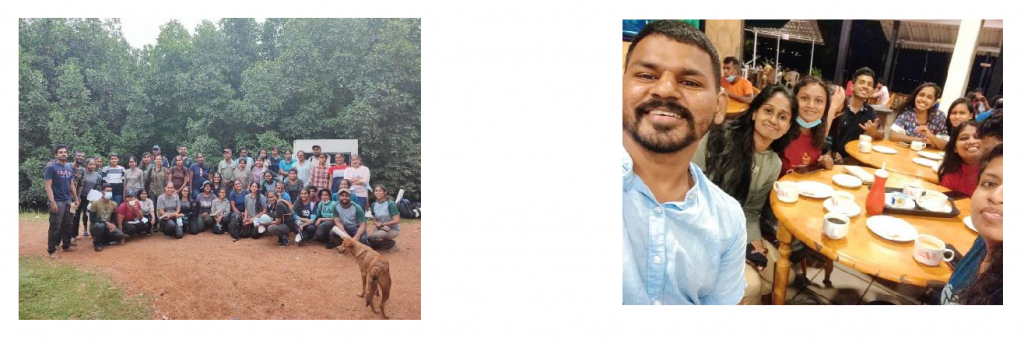
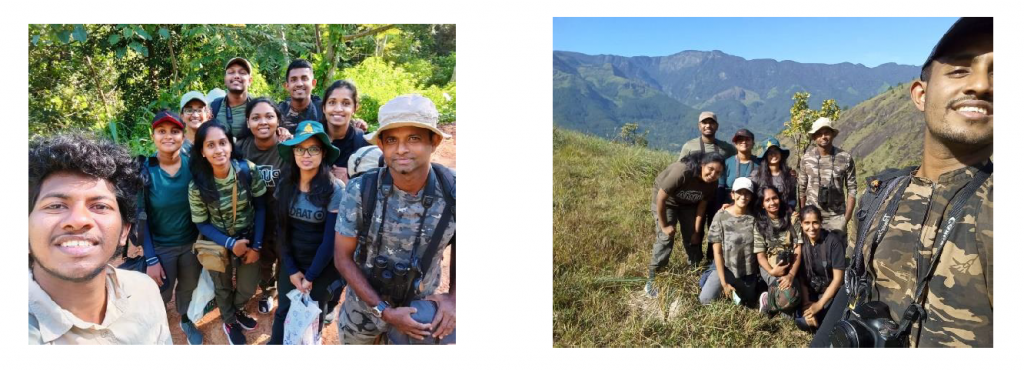
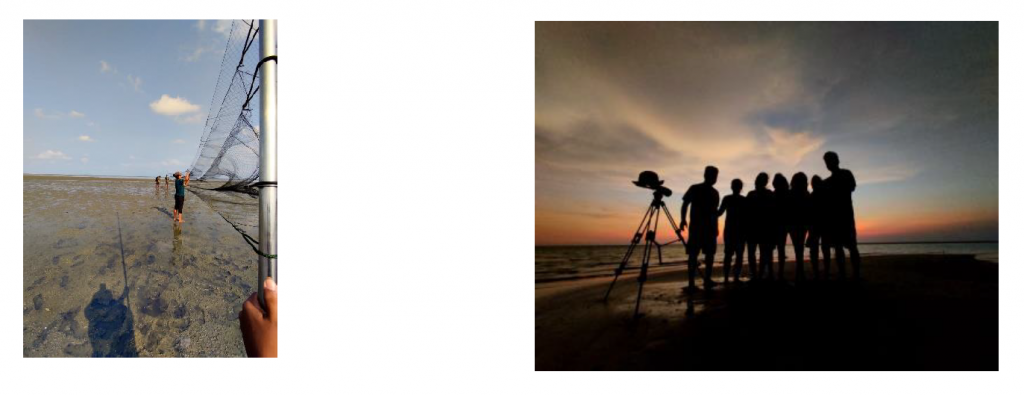

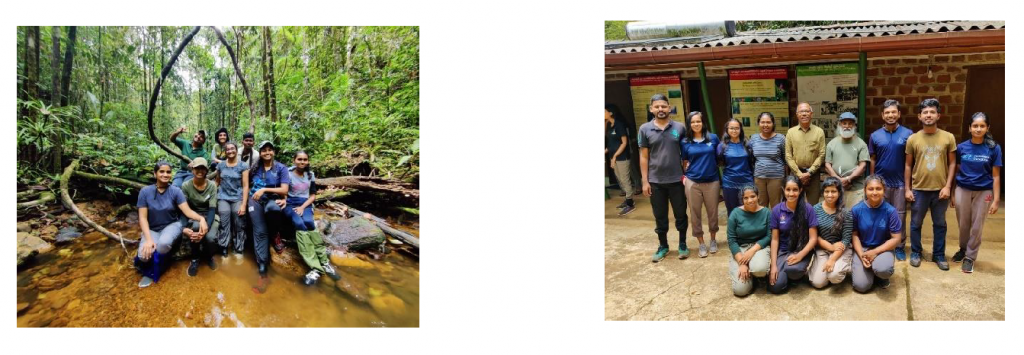
Q: What sorts of fields are covered in this degree program?
A: Basically, the zoology honors stream touches a wide range of interdisciplinary fields to open up a broad range of subdisciplines. Some interesting practical laboratory-based practical sessions covering many aspects are also included.
- The study of evolutionary trends in diverse groups of animals (Evolutionary Biology)
- Biology of insects and pests management (Invertebrate Zoology)
- Ecology and behavior of vertebrate groups (Mammalogy, Fish Biology, Herpetology)
- Species and habitat management (Conservation Biology, Ex-situ Conservation, and Wildlife Management)
- Functioning of the human body (Physiology)
- Enhancing knowledge in the process of growth and development of animals (Development Biology)
- The occurrence of infections and diseases in humans and animals (Parasitology)
Among the more trendy and timely topics we study are Immunology, Molecular Biology, Ecotoxicology, Oceanography, Ornithology, Entomology, Wildlife ecology and Management, Species vulnerability risk assessment, and Bioethics. Many of the courses included embodying, new applications and technologies boosting the professionalism in order to explore this natural world also can be achieved thoroughly. The curriculum is designed in such a way to allow a smooth transition from year 2 to year 3.

Q: What are the course contents taught under this degree program?
A: Below shown is the course content under Zoology special program according to the new syllabus.
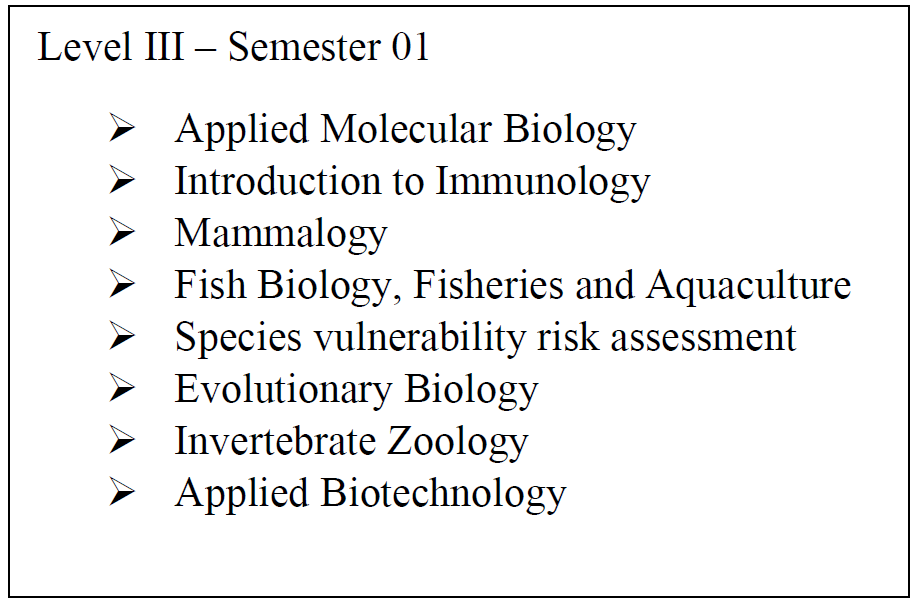
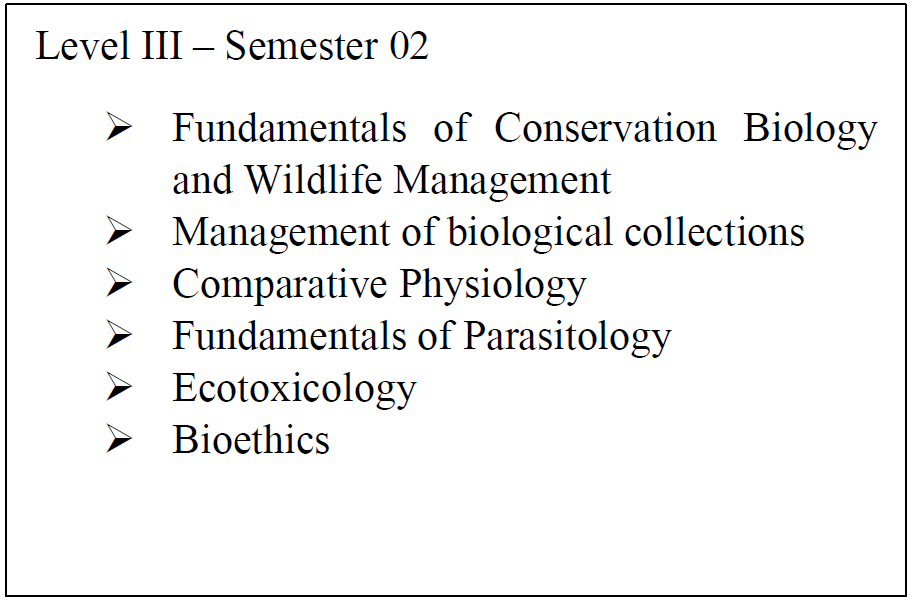
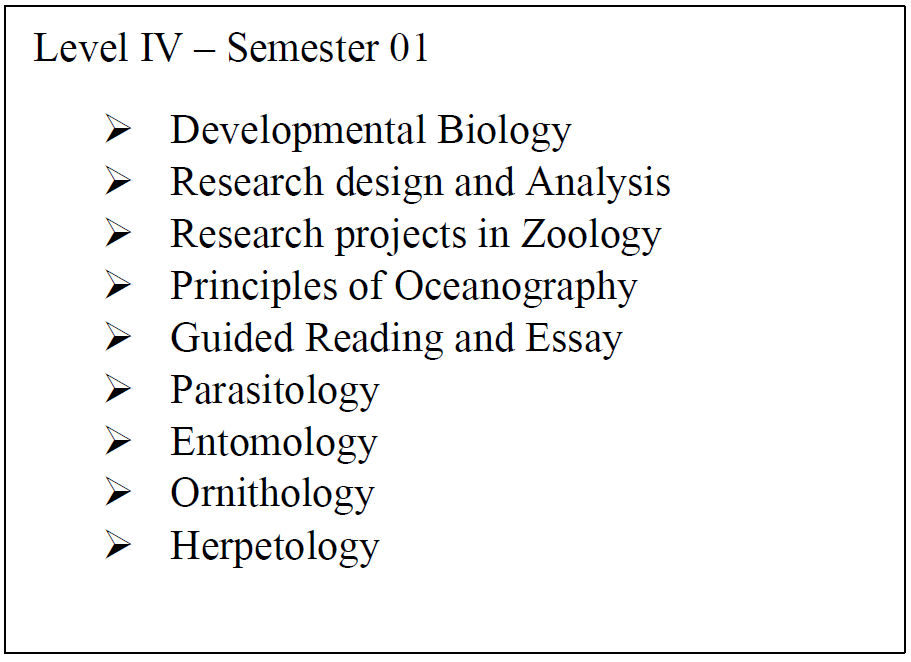
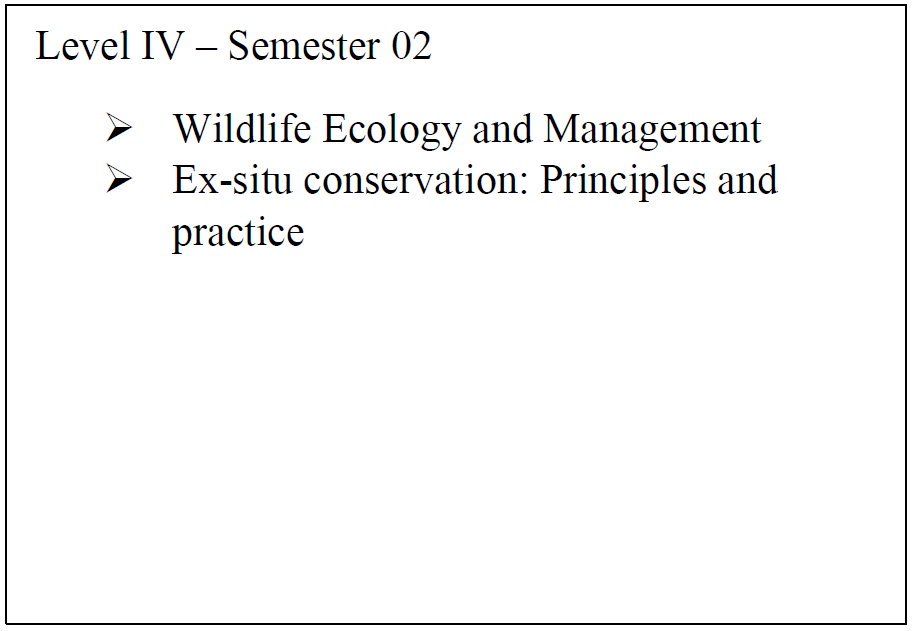
Q: What kind of professions are available to a graduate with this degree?
A: When it comes to the profession, zoology opens doors to a world where a wide range of career paths, such as; becoming a research scientist, lecturer, consultant in specialized fields, curator at museums, management positions at National bodies (Department of Wildlife Conservation, Central Environment Authority, Forest Department, etc.), conservation and sustainability officers at private institutions, working at research institutes, energy and power sectors, travel agencies, tourism, green marketing, agriculture sector, biomedical industries, insurance sectors for environmental risk assessment, and banking sectors, etc.
Q: What are the requirements to be selected for this degree program?
A: The requirement to be selected for the Zoology Honours degree program is to have a GPA of 3.00 or above for ZL core courses. The total weighted marks obtained for the ZL core courses are used to make the selection.
Q: Where are our graduates now?
A: Today our graduates work as top professionals and have achieved success in securing positions for pursuing higher studies in prestigious overseas academic institutions. Below are a few examples.
- Kajanka Mathiaparanam (University of Melbourne, Australia) – Avian Physiology
- Chirthi Wijelulathilake ( Memorial University, Newfoundland, Canada) – Reproductive Ecology of birds ( Dark-eyed Juncos)
- Jeewantha Bandara (Rutgers University, USA) – Fish biology : Species response to climate change
- Thejani Perera (Robert Koch Institute, Germany) – Zoonotic infectious diseases
- Tharaka Wijerathna (Faculty of Medicine, University of Kelaniya) – Medical Entomology
- Madushika Silva (Memorial University, Newfoundland, Canada) – Proteomics
- Sanjaya Weerakkody (University of Colombo & Guangxi University, China) – Vocal evolution of birds (Drongos)
- Nisansala Perera (Charles Sturt University, Australia) – Dung Beetle olfactory ecology
- Dasuni Algiriya (RMIT University, Australia) – Environmental Science and Technology
- Sahan Siriwardana (University of Colombo & Robert Koch Institute, Germany) – Zoonotic Viral Diseases
- Panchali Gunathunga (Nothern Illinois University, USA) – Biological Sciences
- Akila Cooray (Chungnam National University, South Korea) – Iron Channel Physiology
- Tharindu Krishan (University of Alberta, Canada) – Bird community ecology, disturbance ecology, and bioacoustics
- Kavindya Pathirana (University of Minnesota, USA) – Mammalian evolution and biogeography
- Sewwandi Alwis (Ghent University, Belgium) – Master of Science in Marine Biological Resources
- Bhagya Amarasinghe (Utah State University, USA) – Hybridization and speciation in Lycaeides butterflies
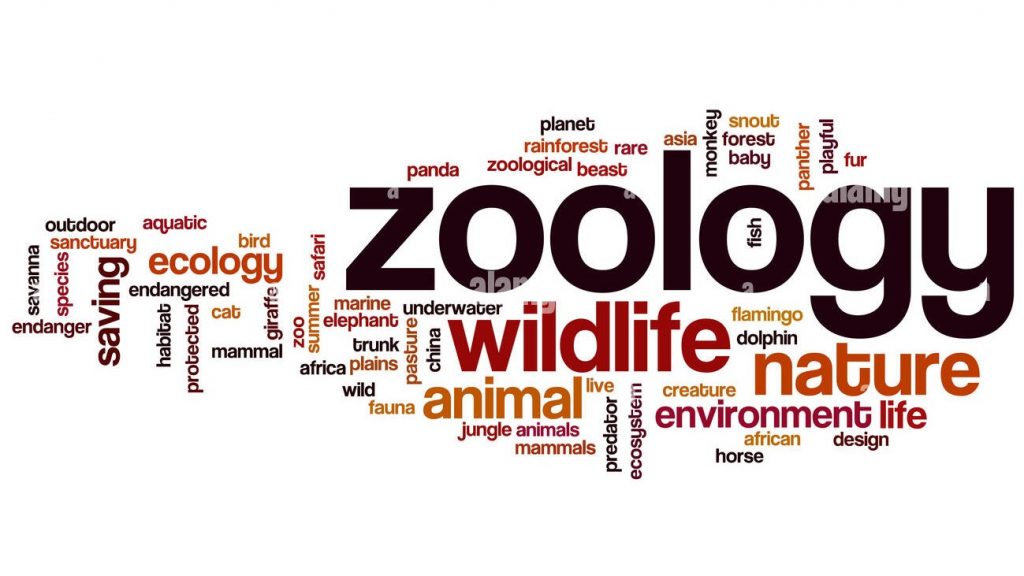
Q: What are the research areas offered in this degree program for undergraduate research?
A: One of the notable features of the department of Zoology and Environment Sciences is the opportunity it affords us to indulge in a research project of our choice. We have the privilege of engaging in research in any field that interests us, under the supervision of any lecturer of our choice. Here are some research areas which were selected by our seniors.
- Dewni Abayadeera – Erythrocyte damage in Leptospirosis, the protective role of Coriander seed extract.
- Iroshmal Peiris – Vocal divergence in a group of divergent forest birds: Babblers of Sri Lanka.
- Toshima Alexander- Uncovering the diversity and distribution of Scolopendrid centipedes in Sri Lanka.
- Rochelle Anthonies – Evacuation of inflammatory markers to assess organ involvement/severity in dengue.
- Chandrakumar Anusha- Teratogenic effects of Albendazole and Levamisole in chick embryo development.
- Bhagya Amarasinghe – Behavioural ecology of sympatric agamid lizards inhabiting the Morningside reserve of Sinharaja rainforest.
- Sanaka Wickramasooriya – Gastrointestinal parasitology and feeding ecology of mammals (Asian elephants).
- Sanjeewa Muhandiram – Population dynamics and habitat utilization of feral spotted deer population inhabiting suburban environs in the lowland wet zone.
- Sewwandi Alwis – Potential contamination of microplastics in marine organisms, and impact of microplastics on feeding behavior of green mussel (Perna viridis) under seminatural conditions.
So, as we see and feel, we have made one of the best decisions in our lives and we are blessed and proud to have been selected for Zoology Honors. It’s not surprising that mother nature frequently leads us down a path that will not only bring you true satisfaction but also prospects for self-improvement and success. Thus, this is your time to make the right decision to pursue your dreams!!!
Here are some links to the videos that we created as memories of our trips and field visits. Enjoy them! On an end note, be passionate about Zoology, and if you take this path, you will never regret your decision.
Trip to Peak wilderness
- https://youtu.be/9dcovWyj75U – By Tharindu Ranasinhe
- https://drive.google.com/file/d/1I2D7TL4HWUeFsRm09znN8T1j1jiAgrdI/view?usp=sharing – By Ayeshma Adikari
Field visit to Attaragoda
- https://youtu.be/tWrBKcAkZJU – By Tharindu Ranasinhe
Field visit to Belihuloya
- https://youtu.be/b2xYw0AEO-I – Tharindu Ranasinhe
Field visit to Mannar
- https://drive.google.com/file/d/1lJljiOC9KK1efJpJqODopZ9O7KNiuqhq/view?usp=drivesdk – Ayeshma Adikari
Field visit to Wasgamuwa
- https://drive.google.com/drive/folders/1f95sCcx_DpfFmIFm–0K2jrcH8Z4J_rK – By Janani Chathurya
Field visit to Sinharaja – Kudawa
- https://youtu.be/-ARuVZtVKlk – By Tharindu Ranasinhe
- https://drive.google.com/file/d/15_kWDaKxKoglVUwhoCEaW3rcxynoAyDQ/view?usp=drivesdk – By Ayeshma Adikari
With lots of love from Zoology-special sisters and brothers!
Image Courtesy:
- Title image: https://bit.ly/3P2wsiR
- Content Image 01: https://bit.ly/38elqXc
- Other content images: Tharindu Ranasinhe and Janani Chathurya



1 Comment
pathum · May 24, 2022 at 2:35 am
wooow